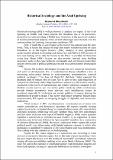Files in this item
Historical sociology and the Arab Uprising
Item metadata
| dc.contributor.author | Hinnebusch, Raymond | |
| dc.date.accessioned | 2015-05-24T23:10:48Z | |
| dc.date.available | 2015-05-24T23:10:48Z | |
| dc.date.issued | 2014 | |
| dc.identifier | 158919517 | |
| dc.identifier | 12db58eb-a138-40ae-b8fd-3886d724cf38 | |
| dc.identifier | 84894386179 | |
| dc.identifier | 000331692800010 | |
| dc.identifier.citation | Hinnebusch , R 2014 , ' Historical sociology and the Arab Uprising ' , Mediterranean Politics , vol. 19 , no. 1 , pp. 137-140 . https://doi.org/10.1080/13629395.2013.856180 | en |
| dc.identifier.issn | 1362-9395 | |
| dc.identifier.other | ORCID: /0000-0001-5800-6606/work/60630148 | |
| dc.identifier.uri | https://hdl.handle.net/10023/6682 | |
| dc.description.abstract | Historical sociology's perspectives—co-constitution of the international and domestic, path-dependency, variegated regime types—help illuminate the state formation paths leading to the Arab Uprising. It also points to how contention between the mass mobilization unleashed by the Uprising and oligarchic inheritances is issuing in variegated hybrid outcomes. | |
| dc.format.extent | 4 | |
| dc.format.extent | 105038 | |
| dc.language.iso | eng | |
| dc.relation.ispartof | Mediterranean Politics | en |
| dc.subject | Historical Sociology | en |
| dc.subject | Arab Uprising | en |
| dc.subject | JZ International relations | en |
| dc.subject.lcc | JZ | en |
| dc.title | Historical sociology and the Arab Uprising | en |
| dc.type | Journal article | en |
| dc.contributor.institution | University of St Andrews. School of International Relations | en |
| dc.identifier.doi | https://doi.org/10.1080/13629395.2013.856180 | |
| dc.description.status | Peer reviewed | en |
| dc.date.embargoedUntil | 2015-05-25 |
This item appears in the following Collection(s)
Items in the St Andrews Research Repository are protected by copyright, with all rights reserved, unless otherwise indicated.

